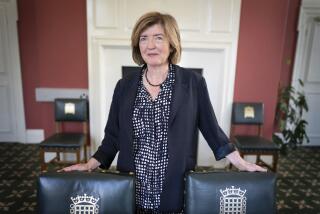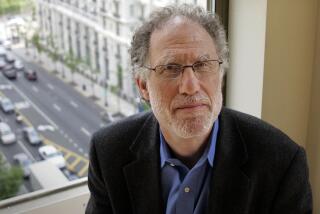Counsel to Bush Draws Rebuke for Airing His Dissent
- Share via
WASHINGTON — Administration officials publicly rebuked C. Boyden Gray Monday after the White House lawyer openly questioned the Contra-aid deal between President Bush and congressional leaders.
The incident has emerged as a rare--and embarrassing--display of internal tension within a Bush White House staff faulted by some critics as inexperienced but which had won high marks for teamwork.
“This was not Boyden’s finest hour,” said one senior White House aide. “Hopefully, we’re back on the right track.”
White House Press Secretary Marlin Fitzwater broadly hinted to reporters that Gray had been admonished. Bush and White House Chief of Staff John H. Sununu met with Gray Monday morning to have “a polite discussion about how things work in the White House,” Fitzwater said. The two discussed with Gray “how the system works and he fully understands that,” Fitzwater said.
Gray publicly questioned over the weekend whether the agreement for more aid to the Nicaraguan rebels called for Bush to surrender too much power. Monday, however, he backed away from those concerns, telling colleagues at the morning White House senior staff meeting that his objections had been “overblown” in newspaper reports, staff members said.
Bush was asked about Gray while he attended Monday’s annual White House Easter egg roll. Looking up at the sunny sky he replied: “On a day like this, I am not angry at anybody.”
Vague Job Description
Gray’s post as White House counsel officially makes him the President’s lawyer, with a broad but vague job description. In some administrations the counsel has been involved in nearly all major policy decisions. In others, the office has been largely technical in nature.
The present counsel is personally close to Bush, having served as a key adviser during all eight years of Bush’s vice presidency. But his current role is somewhat unclear--a factor that may have influenced him to try to become involved in this case, White House aides suggested.
Gray’s objections had no substantive impact. But their public nature was an embarrassing distraction from the White House campaign to gain maximum public advantage from the new policy. “It’s a major accomplishment,” a senior Bush aide said. “We hope it doesn’t all get swept aside by this.”
When asked if Bush or Sununu had told Gray to stop airing policy objections in newspaper interviews, Fitzwater replied: “I think that’s a good idea--I’d be glad to tell him that.”
The incident began to develop Friday after Bush presided over a White House ceremony in which he signed a new accord on Central America with congressional leaders and praised the new agreement as a major accomplishment and a step toward restoring a bipartisan foreign policy.
Within hours, Gray, who was not consulted on the deal, sent a memo to Bush questioning the terms. Gray focused particularly on Bush’s agreement that none of the money appropriated for Contra aid would be spent after Nov. 30 without the approval of four congressional committees. That, he said, smacked of an unconstitutional “legislative veto” of executive action.
Other Bush aides responded to the memo, explaining that the deal with Congress had been carefully reviewed by State Department lawyers and other attorneys on the White House staff and that no legal problems had been found. The agreement on the November review was simply a “moral agreement” under which the President promised not to do something if Congress objects, not a legislative veto, they said.
More to Read
Sign up for Essential California
The most important California stories and recommendations in your inbox every morning.
You may occasionally receive promotional content from the Los Angeles Times.











